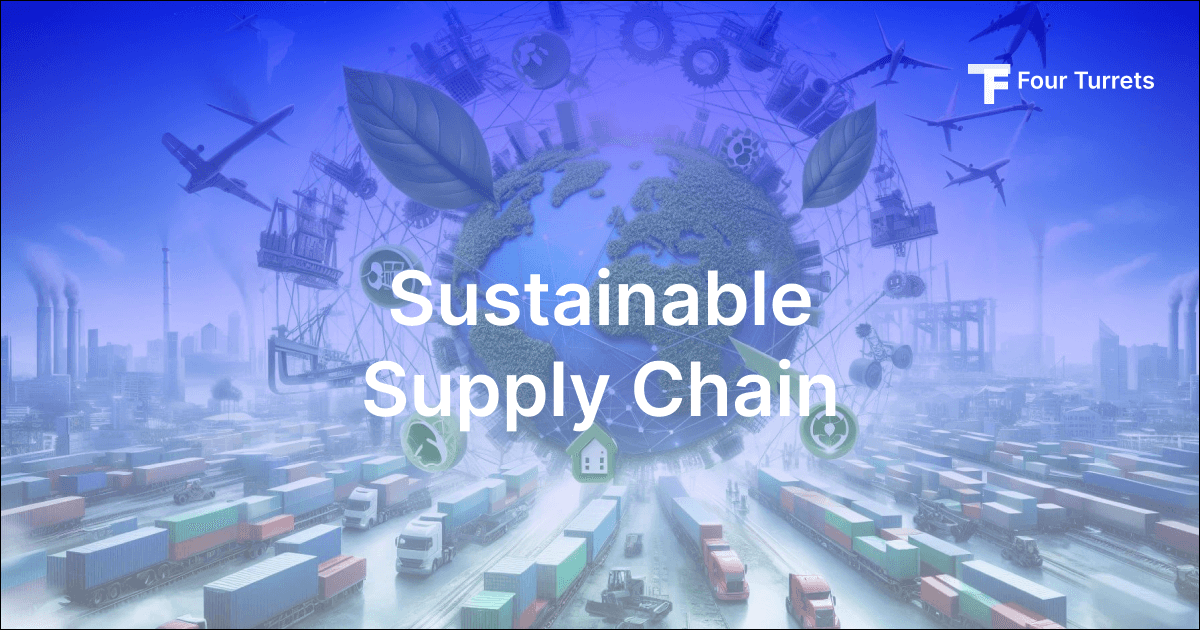While we see lost of environmental challenges and changes taking shape in our current situation, the concept of sustainable supply chains has emerged as a critical focus for businesses worldwide. This blog delves into the intricacies of sustainable supply chains, exploring their significance in fostering environmental stewardship and ethical responsibility. As companies grapple with the challenges of reducing their carbon footprint and promoting fair labour practices, sustainable supply chains offer a pathway to achieving these goals.
By integrating eco-friendly practices and transparent operations, businesses not only enhance their brand reputation but also contribute to a healthier planet.
Join us as we navigate the complexities of sustainable supply chains, highlighting innovative strategies, industry success stories, and the vital role they play in shaping a sustainable future for generations to come.
What is a Sustainable Supply Chain?
A sustainable supply chain focuses on integrating sustainable practices into supply chain management to meet sustainability goals. This involves collaboration with each supplier to implement best practices and sustainable procurement strategies. By enhancing supply chain transparency and visibility, companies can ensure sustainable sourcing of raw materials and promote sustainable packaging solutions.
Efforts to improve supply chain sustainability include reducing carbon emissions and emission levels through efficient shipment methods and inventory management. Additionally, adopting a circular economy approach can help reduce waste by encouraging recycling and reuse practices throughout the supply chain. Implementing these supply chain solutions across the entire supply chain enhances social responsibility and supports a green supply chain.
Companies can make their supply chains more sustainable by aligning supply chain operations with supply chain sustainability efforts. This involves improving supply chain practices and ensuring supply network alignment with global supply standards. Ultimately, sustainable supply chain management drives value across the value chain, helping businesses meet their sustainability efforts while maintaining efficient operations and supply.
Importance of Sustainability in Supply Chains
The importance of sustainability in supply chains cannot be overstated, as it plays a pivotal role in achieving sustainable development goals. Supply chain professionals are increasingly focusing on best practices for supply chain sustainability to drive sustainable growth and ensure that business practices are aligned with environmental objectives. A sustainable supply chain incorporates sustainability practices across the supply chain, from sourcing to end-user delivery.
For supply chain managers, enhancing supply chain visibility and collaborating with supply chain partners are critical steps to implement sustainable solutions. A circular supply chain approach can further help businesses become more sustainable by minimizing waste and maximizing resource efficiency. Investing in a sustainable solution also involves making strategic sustainable investment decisions.
In the context of the global supply chain, achieving an end-to-end supply chain that prioritizes supply chain sustainability is essential. By adopting these strategies, companies can ensure their supply chain’s resilience and longevity within the supply chain ecosystem.
How do Sustainable Supply Chains Work?
Supply chain sustainability is important for companies aiming to reduce their environmental impact while maintaining efficiency and profitability. Supply chain sustainability refers to integrating environmental and social considerations into chain management. This is the practice of overseeing the flow of goods and services with sustainability in mind. To create a sustainable supply chain, companies must adopt best practices that drive sustainable operations, such as using sustainable materials and optimizing logistics to reduce carbon footprints.
Many companies are now embedding sustainability in their supply strategies, recognizing the benefits of supply chain sustainability. These benefits include enhanced brand reputation, cost savings from efficient resource use, and compliance with regulatory standards. A sustainable supply chain can help companies mitigate risks associated with resource scarcity and climate change impacts.
The supply chain journey involves various stages, from sourcing raw materials to delivering finished products. Throughout this journey, supply chain sustainability initiatives are crucial. Companies must continually assess and adapt their processes to ensure they align with practices that drive sustainable supply chains. By doing so, they contribute to a more resilient and environmentally friendly global economy.
What are the Key Elements of Supply Chain Sustainability?
Important considerations of supply chain sustainability have become a focal point for businesses worldwide. As chain management is the practice of overseeing the flow of goods and services, integrating sustainability is crucial for long-term success. An understanding of supply chain sustainability involves recognizing the environmental, social, and economic impacts of supply chain activities. Supply chain management focuses on optimizing these activities to minimize negative impacts while enhancing efficiency. The supply chain starts from raw material sourcing and extends to product delivery, requiring companies to make their supply chains more resilient and eco-friendly.
A sustainable supply chain accounts for the entire lifecycle of a product, from production to disposal. Setting clear supply chain sustainability goals helps organizations incorporate sustainability into their supply chain effectively. This involves rethinking supply chain execution strategies to reduce waste and carbon footprint. Companies can increase supply chain sustainability by adopting environmental practices such as using renewable energy sources and reducing emissions.
Incorporating order management systems that prioritize sustainable options can further create more sustainable supply chains. As the business landscape evolves, sustainability is no longer an optional consideration but a necessary component of strategic planning. Companies must innovate and adapt to remain competitive and responsible when it comes to sustainable supply chain management. By embedding sustainability into their core operations, businesses can ensure they meet both current and future demands while contributing positively to the planet.
How to Build a Sustainable Supply Chain
Creating a sustainable supply chain is no longer just an environmental imperative—it’s a strategic business advantage that can reduce costs, enhance brand reputation, and improve operational resilience. Here’s a practical roadmap for building sustainability into your supply chain operations:
Conduct a Comprehensive Supply Chain Assessment
Start by mapping your entire supply chain to understand its environmental and social impact. Evaluate each stage from raw material sourcing to final delivery, identifying hotspots where improvements can make the biggest difference.
This assessment should consider the triple bottom line of sustainability: economic, environmental, and social aspects ensuring your approach balances profitability with responsibility.
Implement Strategic Supplier Selection and Partnership
Establish clear sustainability criteria for supplier selection that go beyond cost considerations. Prioritize partners who demonstrate genuine commitment to eco-friendly practices, fair labor standards, and sustainable materials. However, be aware that suppliers at lower levels of the chain often face challenges in meeting these standards, so consider providing support and resources to help them improve rather than simply switching suppliers.
Optimize Logistics and Reduce Environmental Impact
Focus on reducing your carbon footprint through smarter logistics strategies This includes:
- Consolidating shipments to maximize efficiency
- Investing in fuel-efficient transportation options
- Implementing advanced inventory management systems to minimize waste
- Optimizing delivery routes using data analytics
These improvements often deliver immediate cost savings while supporting environmental goals.
Leverage Technology for Continuous Improvement
Use data analytics and IoT technology to enhance supply chain visibility and decision-making. Continuous monitoring allows you to make informed decisions that align with sustainability goals while improving overall efficiency This technology-driven approach helps create a more resilient supply chain that can adapt to changing market conditions and regulatory requirements.
Build Stakeholder Engagement and Transparency
Create a culture of sustainability by engaging employees, customers, and communities in your efforts. Regular reporting on sustainability progress builds trust and accountability, while stakeholder feedback often leads to innovative solutions that benefit both business performance and environmental impact.
If you are dealing with the global supply chain and want to grow your business with professional help, come join us. We at Four Turrets offer you the most technologically advanced solutions for the global supply chain. Let us become your sourcing partners and exporters to grow your revenue numbers.







